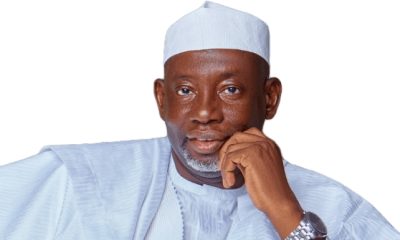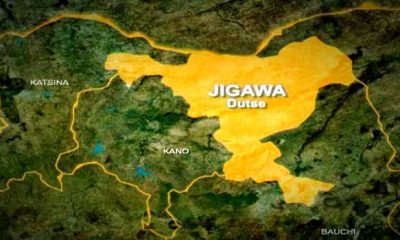Headline
Jigawa, NEPZA agree to revitalise state’s free trade

Jigawa State Government and the Nigeria Export Processing Zones Authority (NEPZA) have agreed to revitalise the state’s Maigatari Export Processing Zone.
The duo agreed when the Jigawa State Governor, Umar Namadi, visited the Managing Director of NEPZA, Prof. Adesoji Adesugba on Wednesday in Abuja.
According to the Namadi, the Free Trade Zone(FTZ) has numerous potentials and benefits to the people and the country at large and needs to be made operational.
The governor said:“We felt that we have a free zone that has been lying fallow for some years and we need to bring it into operation.
“And the best place we should start this process is NEPZA, so we made contacts and the managing director agreed to see us in such short notice.
“We came here to solicit for their expert advice on how we can bring our free zone into operation and to solicit for the MD’s support in terms of licences and registration fees.
“We know that we are owing the authority and we feel that he (Adesugba) should be able to allow us some leverage so we can stagger the payment and resume operations.”
According to Namadi, the free zone has a lot of potentials and it is going to contribute to the economic development of this country.
“In addition to giving lots of opportunities to our youths to get employed among other things.
“So because of that, it is necessary that we put it into operation, and you cannot do that without consulting experts and I think NEPZA is the best place to come.
“And that is why we are here. We are happy with the discussions we had with the MD and the fact that he is so committed to make the free zone work. So we think the visit is fruitful,” Namadi said.
On time frame, the governor expressed optimism that before the end of 2023 the FTZ should come into operation as everything necessary to make it work was available.
On security, Namadi said:“Jigawa is so far the safest state in Nigeria but we are also security conscious and making sure that investors and the state is well secured.
Responding, the NEPZA boss expressed the committment of the Authority to support the state and all other states willing to drive trade and develop the country’s economy.
Adesugba said:“We have been trying to work with the state to activate that free zone because we see it as a critical infrastructure that could do a lot for that part of the country.
“So we cannot say more than we are happy and we are going to work straight away on our first meeting to determine and structure the way forward.
“The governor has given us ultimatum that before the end of this year we should make it work but you know of course that we have a track record.
“We have done it for Kano, Calabar free zone and we are confident that with the kind of Governor we have, working with NEPZA we will definitely deliver this reactivation programme within the shortest period of time. “
Some of the issues which the duo planned on discussing includes revitalisation of the zone’s infrastructure facilities and hibiscus sorting, grading and packaging.
Other areas are bulk breaking centres and warehousing facilities, payment of outstanding operational licence fees from 2017 to date and formation of steering committee to bring up recommendations within five weeks.
Headline
Fagbemi warns against obstructing EFCC from performing its lawful duty

The Minister of Justice, Lateef Fagbemi, SAN has warned against obstructing the Economic and Financial Crimes Commission (EFCC) from carrying out its lawful duty .
Fagbemi’s warning is contained in a statement in Abuja.
“This is a matter of very grave concern, it is now beyond doubt that the EFCC is given power by the law to invite any person of interest to interact with them in the course of their investigations into any matter, regardless of status.
“Therefore, the least that we can all do when invited, is not to put any obstruction in the way of EFCC, but to honourably answer their invitation.
“A situation where public officials who are themselves subject of protection by law enforcement agents will set up a stratagem of obstruction to the civil and commendable efforts of the EFCC to perform its duty is to say the least, insufferably disquieting’’.
He added that running away from the law will not resolve issues at stake but only exacerbate them.
“Nigeria has a vibrant judicial system that is capable of protecting everyone who follows the rule of law in seeking protection.
“I therefore encourage anyone who has been invited by the EFCC or any other agency to immediately toe the path of decency and civility by honouring such invitation instead of embarking on a temporising self-help and escapism.
“This can only put our country in bad light before the rest of the world’’.
He said institutions of state should be allowed to function effectively and efficiently.
“I stand for the rule of law and will promptly call EFCC, and indeed any other agency to order when there is an indication of any transgressions of the fundamental rights of any Nigerian by any of the agencies’’.
NAN reports that the EFCC had on Wednesday warned members of the public that it was a criminal offence to obstruct officers of the Commission from carrying out their lawful duties.
Section 38(2)(a(b) of the EFCC Establishment Act makes it an offence to prevent officers of the Commission from carrying out their lawful duties. Culprits risk a jail term of not less than five years.
The warning , the EFCC said, became necessary against the background of the increasing tendency by persons and groups under investigation by the Commission to take the laws into their hands by recruiting thugs to obstruct lawful operations of the EFCC.
On several occasions, the anti graft agency said, operatives of the Commission have had to exercise utmost restraint in the face of such provocation to avoid a breakdown of law and order.
Headline
Unknown Gunmen Abduct Channelstv Reporter In Port-harcourt

Some unknown gunmen have kidnapped Joshua Rogers, the ChannelsTV reporter in Port-Harcourt, the Rivers State capital.
Politics Nigeria learnt that Rogers was picked up close to his residence at Rumuosi in Port Harcourt and to an unknown destination by the gunmen around 9pm on Thursday, April 11.
The reporter was driving his official ChannelsTV branded car when the hoodlums accosted, pointed a gun at him and took him away in the same vehicle.
Rogers was said to be returning from his official assignment in Government House after a trip to Andoni for a government event when the incident happened.
Already, the gunmen were said to have contacted his wife and demanded a N30million ransom for bis release.
His cameraman confirmed the incident and appealed to his abductors to set him free unconditionally.




















